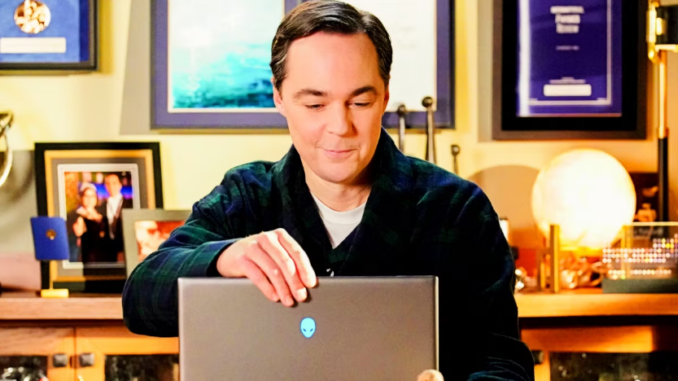
The Heartbreaking Reason Why Sheldon’s TBBT Apartment Didn’t Have a Dining Table
The Big Bang Theory brought us a world filled with science, humor, and quirky habits. Among these was Sheldon Cooper’s insistence on certain peculiarities in his shared apartment with Leonard, one of which was the absence of a dining table. This seemingly trivial detail carries a deeper emotional weight, rooted in Sheldon’s childhood as revealed in Young Sheldon.
Let’s explore how a small piece of furniture tells a big story about family, loss, and healing.
Sheldon’s Apartment Quirks Explained
Sheldon’s apartment in The Big Bang Theory was a reflection of his personality. From the seating arrangement to his obsessive rules, every element had a purpose. But the missing dining table wasn’t just a random quirk—it was a window into Sheldon’s unresolved past.
The Role of Family Dinners in Young Sheldon
The Cooper Family’s Dinner Rituals
In Young Sheldon, family dinners were a cornerstone of the Coopers’ daily life. The table was where they shared food, conversations, and sometimes arguments. It was a place of connection, despite their many differences.
The Tragedy That Changed Everything
When George Cooper Sr., Sheldon’s father, unexpectedly passed away, those family dinners stopped. The dining table, once a symbol of togetherness, became a painful reminder of what they had lost.
Sheldon’s Aversion to Change in TBBT
The Couch as a Comfort Zone
In The Big Bang Theory, Sheldon insisted on eating meals on the couch. His friends often suggested adding a dining table, but he always refused. His reasoning? He didn’t like change.
A Deeper Emotional Explanation
Through the lens of Young Sheldon, it becomes clear that Sheldon’s resistance wasn’t just about his dislike of change. It was a subconscious effort to avoid memories tied to the dining table and his family’s loss.
How Young Sheldon Shaped Sheldon’s Personality
A Childhood Defined by Rules
Sheldon’s need for control and structure began early. In Young Sheldon, his rigid routines often clashed with his family’s more relaxed approach, setting the stage for his future quirks.
Processing Grief Through Avoidance
Sheldon’s refusal to have a dining table can be seen as part of his broader strategy for dealing with grief—by avoiding triggers that reminded him of his father’s death.
Dining Table or No Dining Table? The Debate in TBBT
Friends vs. Sheldon’s Preferences
Leonard, Penny, and the gang often suggested practical changes to the apartment, including adding a dining table. But Sheldon’s stubbornness always won out.
When Quirks Mask Pain
To his friends, Sheldon’s behavior seemed like another one of his oddities. However, viewers who followed Young Sheldon understood the deeper emotional scars driving his choices.
Sheldon’s Transformation With Amy
Amy’s Influence on Sheldon
Amy Farrah Fowler played a key role in helping Sheldon break out of his rigid shell. When they moved in together, the couple embraced having a dining table in their new apartment.
A Step Toward Emotional Healing
This shift symbolized Sheldon’s growing ability to process his childhood emotions. By creating new memories with Amy, he allowed himself to reclaim spaces that once brought pain.
The Symbolism of Furniture in Storytelling
How Props Reflect Character Growth
The absence or presence of a dining table in Sheldon’s apartments wasn’t accidental. It was a subtle but powerful tool to highlight his personal journey.
Healing Through Connection
From avoiding a dining table to embracing one, Sheldon’s evolution showed how relationships and love helped him heal.
Why Fans Connect With This Detail
Relatability in Grief and Growth
Many fans resonate with Sheldon’s story because it mirrors real-life experiences of loss and emotional recovery.
A Lesson in Resilience
Sheldon’s journey reminds us that healing is a process, often aided by the people who care about us.
Conclusion
Sheldon Cooper’s reluctance to have a dining table in The Big Bang Theory might have seemed like a trivial quirk at first glance. However, Young Sheldon revealed the emotional depth behind this choice, tied to his childhood grief and the loss of his father. As Sheldon grew and formed meaningful relationships, he slowly let go of the past, showing that even the most stubborn hearts can heal.
5 FAQs
1. Why didn’t Sheldon want a dining table in The Big Bang Theory?
Sheldon’s aversion stemmed from emotional associations with his childhood and family dinners, particularly after his father’s passing.
2. How did Amy help Sheldon overcome this?
Amy’s influence helped Sheldon process his feelings and embrace change, including using a dining table in their shared apartment.
3. What role did family dinners play in Young Sheldon?
Family dinners were a key part of the Coopers’ lives, symbolizing connection and togetherness until tragedy struck.
4. Was Sheldon’s quirk just about control?
While Sheldon’s need for control was part of it, his dining table aversion had deeper emotional roots tied to his childhood grief.
5. Does this detail make Young Sheldon essential to understanding TBBT?
Absolutely. Young Sheldon provides valuable context for many of Sheldon’s quirks, adding emotional depth to his character.
